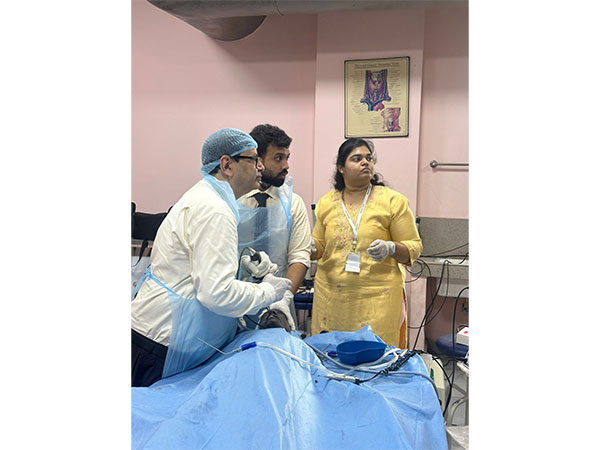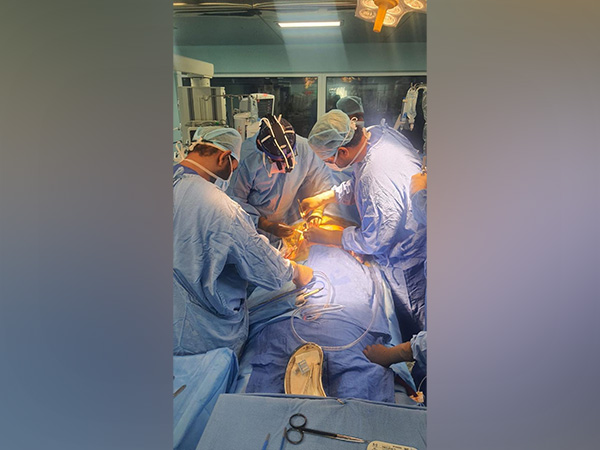BDSLCCI becoming the first Business Domain Specific Cybersecurity Framework to protect Small and Medium Enterprises (SMEs) from various Cyber Threats
Jan 17, 2023
New Delhi [India], January 17 (ANI/SRV): With the vision of improving the cybersecurity of small and medium enterprises (SME), "Business Domain Specific Least Cybersecurity Controls Implementation (BDSLCCI)" is now being adopted by various companies worldwide. SecureClaw Inc., a new venture by Dr Shekhar Pawar, has developed BDSLCCI.com, an AI and machine learning-based web platform. Any SME representative can sign up by visiting this web portal and utilizing its user-friendly functionality. Various SMEs worldwide have begun registering themselves on the BDSLCCI web portal in recent months.
The brain behind the initiative, Dr Shekhar Pawar, has utilized his ground-level cybersecurity work experience as a lead cybersecurity auditor and implementer for various international assignments while leading his first venture, GrassDew IT Solutions. He has spent years conducting research studies to identify cybersecurity gaps in SMEs and develop this new approach to address those issues. There are 400 million SME companies worldwide, responsible for 60-70 per cent of employment opportunities and 55 per cent of GDP contribution in developed economies. With Industry 4.0 and digitization, the attack surface of SMEs has increased, which has helped hackers. According to the latest research published in 2022, "LCCI: A Framework for Least Cybersecurity Controls to be Implemented for Small and Medium Enterprises (SMEs)" in Elsevier's JJIMEI international journal, one out of every two SMEs is facing a cyberattack. It costs more than USD 2.2 million a year on average; 43 per cent of cyberattacks target small businesses; and 60 per cent of small businesses shut down within six months of a cyberattack. Hackers are developing new methods to improve their ability to commit cybercrime, according to studies from various cyber news sources.
"An earlier ransomware attack was only encrypting the computers and asking for a ransom for the decryption key," says Dr Shekhar Pawar. "Following the decryption key ransom, cybercriminals began threatening victim organisations with selling the hacked data on the dark web. It is double extortion. Now, recent cyber news is talking about triple extortion, where hackers can further use the hacked information to perform a Distributed Denial of Service (DDoS) attack to flood the victim's server with traffic, etc. BDSLCCI is on a mission to provide a good cybersecurity posture for more than four million SMEs in the upcoming few years."
Dr Shekhar Pawar conducted an analysis of the various inputs from the top management of SME companies in 19 countries during his doctoral studies on the cybersecurity of the SME segment at SSBM Geneva, Switzerland. The participating SMEs were from Australia, Bangladesh, Cyprus, Ghana, Hong Kong, India, Indonesia, Israel, Malaysia, Nigeria, Norway, Russia, Singapore, South Africa, Sri Lanka, Sweden, the United Arab Emirates, the United Kingdom, and the United States. According to research, existing leading cybersecurity standards appear very expensive for SMEs, as they demand hundreds of controls to be implemented. Also, SMEs do not have enough resources to adequately implement those. More importantly, existing standards provide a generic set of cybersecurity controls for all business domains, with no relevance to top management's business priorities or return on cybersecurity implementation investment (ROI). It has caused many SMEs to either not go ahead with the cybersecurity controls implementation or to choose any random controls as their own. It is a significant risk for the SME sector.
As an outcome of the international research studies, Dr Shekhar Pawar has invented and published internationally BDSLCCI, which provides tailored cybersecurity controls for each business domain of the SME segment, reducing the number of controls to be implemented, the required time, and the overall implementation cost, and hence increasing the ROI. It means that SMEs working in e-commerce must implement a certain set of controls, while SMEs working in manufacturing must implement their domain-related set of cybersecurity controls, and so on.
There are three stages of the BDSLCCI journey of SME, known as Level 1 through Level 3. It helps the top management of SME businesses to invest stage-wise with direct protection for the mission-critical assets of their business. When a SME representative logs in to the BDSLCCI web portal, an AI-ML-based software algorithm shows the recommended stage-wise cybersecurity control journey. SME can implement those, upload evidence showing effective implementation, and get a certificate of the BDSLCCI level attained after an online audit performed by the BDSLCCI auditors. To assist many SMEs, BDSLCCI is expanding its network of certified lead auditors and member organisations worldwide.
To sign up for BDSLCCI, visit:
Email: CustomerService@BDSLCCI.com
Contact: (+91) 882-821-2157
Know more about Company:
This story has been provided by SRV. ANI will not be responsible in any way for the content in this article. (ANI/SRV)








